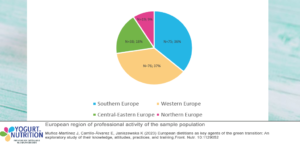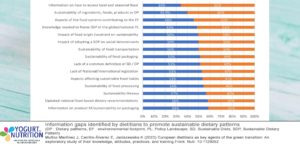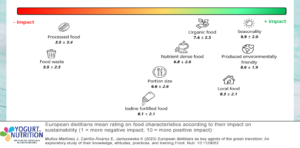Latest research has highlighted the pivotal role of dietitians in shaping a healthier, more sustainable world (1). They’re ideally placed to help people switch to healthy, eco-friendly diets and so drive sustainable food systems that are vital for our green transition.
The research, based on an online survey, has revealed that dietitians across Europe are keen to embrace the challenge of promoting sustainable dietary patterns (SDPs) and food systems. But many lack the training or resources they need to guide their clients towards SDPs, and few of them are actually able to apply sustainability in their work settings,
Overcoming these barriers and empowering dietitians with the required knowledge and skills could make all the difference to our future and to the generations that follow, say the researchers.
Why are dietitians so important in the green transition?
As more people around the world turn to western-style dietary habits, pressure on the planet’s natural resources is increasing, along with the burden of disease that goes hand-in-hand with unhealthy diets (2).
It’s essential that we shift towards win-win diets that benefit our health and ease the pressure of our food systems on the environment (3).
Dietitians are seen as facilitators of the shift toward more sustainable food systems, as they can offer advice to guide people in adopting more sustainable diets (4,5,6). By providing individual counselling and implementing public health measures such as food-based dietary guidelines, dietitians can help to shape the dietary patterns of a population.
In order for this to happen, dietitians must be equipped with the knowledge, skills and resources they need to take on this new role. The first step is to find out what they know already and how willing they are to get to grips with SDPs, say the researchers.
Hence this study explored the knowledge, attitudes, practices, and training of dietitians across Europe, aiming to discover how much they knew about the environmental impact of food choices and whether they were already incorporating sustainable principles in their everyday work.
Dietitians have gaps in their knowledge about sustainable diets
Responses to an online survey from 208 dietitians living in 25 European countries revealed that three-quarters of them felt confident in being able to define a SDP. Most could identify environmental sustainability, correctly recognising seasonal, locally-produced foods and plant-based diets as having a low environmental impact while meat has the highest impact on climate.
But there were knowledge gaps as the dietitians were less familiar with the social and economic aspects of sustainability
Most of the responding dietitians were keen to learn more about these topics, recognising the importance of their role in promoting sustainable food choices.
Few dietitians include sustainability advice in their consultations
Dietitians actively integrated sustainability principles in their practice, encouraging their clients to adopt eco-friendly diets such as plant-based, locally-sourced foods and emphasising the importance of reducing food waste.
But most respondents to the survey admitted they had not yet incorporated this advice into their consultations, citing challenges such as lack of time or resources. They also felt that some of their clients were not receptive to the idea of switching to a sustainable diet.
Other obstacles to implementing these changes included a lack of updated national food-based guidelines and of support from their peers or managers.
Training is essential to support dietitians in promoting sustainability
The survey revealed that only 25% of the European dietitians ever received training on SDP.
Thisfinding led the researchers to call for universities and training organisations to deliver comprehensive courses for dietitians on sustainability and to include this in undergraduate degrees. The researchers also urged public authorities to develop up-to-date food based dietary guidelines with sustainability principles to help dietitians promote SDPs.
Why do we need to make the green transition?
Today’s food systems fall well short of those needed for a sustainable planet. Food systems – agriculture in particular – are blamed for up to 34% of greenhouse gas emissions (7), 80% of deforestation, 40% of global land use (8), and 70% of freshwater use (9).
Apart from the environmental impact, unhealthy diets place a major burden on global health. Eating too few fruits and vegetables and too much processed meat, sugar, and salt are associated with chronic diseases, such as type 2 diabetes, at huge cost to the individuals affected, their families, and health care provision.
‘Our study shows that European dietitians are, regardless of their background, undeniably willing to contribute to combating climate change and acknowledge their role in building a more resilient planet.’ – Muñoz-Martínez J, et al, 2023






